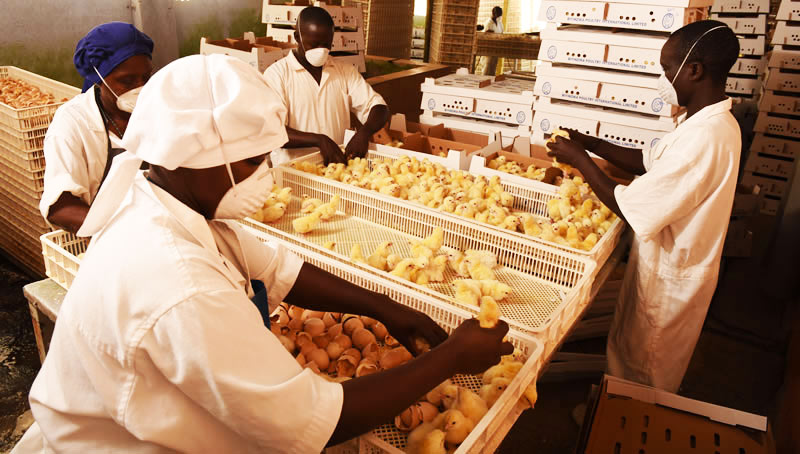Kampala, (UG): Uganda’s most prominent mogul in the poultry business, Mr Samuel Mukasa the proprietor of Biyinzika Enterprises Ltd is on the verge of losing his multi-million dollar company properties over a bank loan.
The wealthy poultry mogul who became popular with the brand name Biyinzika has over the past 31 years run the company which primarily deals in hatcheries and sales of chicks across the East African region.
Biyinzika, which also deals in poultry feeds previously controlled about 65% of Uganda’s poultry market share before the COVID-19 pandemic outbreak which saw the company lose most of its market, suppliers and employers.
The company which is valued at over Sh40 billion has been instrumental in Uganda’s agri-business sector, employing over 10,000 people but now seems to be collapsing over an unpaid loan facility.
Despite the details of the bank loan being unclear, the lawyers representing the lending institution; Tumusiime, Kabega & Co. Advocates have already advertised some of Biyinzika’s properties in local newspapers, saying they will be auctioned by October 12, 2023.
“Duly instructed by our client, the registered mortgage, a financial institution, we do hereby give notice of intention to sell the land and developments described below to realise monies due to the mortgagee unless the debtor (Biyinzika) shall pay the monies due on the mortgage together with the associated fees and costs of recovery before the date of sale (30 days after the advertisement.)”

The advertised properties include Dina Apartments in Ntinda, Kampala; 41 acres of land in Kasambya with hatcheries with a capacity of 460,000 birds per week; and 100 acres of land in Bulemeezi.
Information obtained indicates that in 2014, a venture capital fund known as 8 Miles provided equity to Biyinzika for the poultry business to expand. The company was renamed Biyinzika International. At the time, the company wanted to sharpen its focus on new products for regional markets.
8 Miles eventually took over the management of the business, compelling Mukasa to open Biyinzika Enterprises which is now struggling with loans.
COVID-19 impact
Due to the economic impact of the COVID-19 pandemic, many indigenous Ugandan companies and businesses are on the verge of losing, or have already lost, tangible assets which they used as collateral for securing bank financing.
These companies are now reportedly seeking bailouts from the government to stabilise their financing structure.
A myriad of factors including inter alia, high commercial bank interest rates, Government’s failure to pay suppliers, political instability in key regional export markets like South Sudan, and the weakening economy have been suggested as causes of the companies’ poor performance.
Biyinizika’s family members have since been quoted by the media asking for a government bailout as they were employing thousands of employees and bringing in foreign exchange from export of poultry to the region.
Some of the companies which the government has bailed out recently include Atiak Sugar and Roko Construction Company among others.
Experts say government bailouts should only be limited to a few companies that contribute significantly to the national treasury by paying taxes and employing a high number of people.
However, even these should be thoroughly audited to ascertain the causes of business failure and the subsequent ability to repay the bailout funds by the recipient company. Further research has since shown that firms recovered more fully from nongovernmental bailouts.
This is because governments don’t monitor firms post-bailout as closely as large shareholders and banks. Secondly, governments may bail out a firm to keep people employed or to keep the economy going, regardless of the firm’s performance. And third, governments are more inclined to bail out firms with government connections.
Finance experts have as well advised struggling companies to raise money from capital markets.
One of the major advantages of undertaking financing by offering shares to the public is that the company will have no obligation to repay shareholders at a future date; as opposed to a bank loan that entails monthly interest repayments and principal to be paid upon maturity. This greatly reduces the constraints on the company’s cash flows.
The equity finance raised can be used to clear pressing debt and offer the company the urgently needed cash flows for business operations.
If you would like your article/opinion to be published on Uganda’s most authoritative news platform, send your submission on: [email protected]. You can also follow DailyExpress on WhatsApp and on Twitter (X) for realtime updates.



